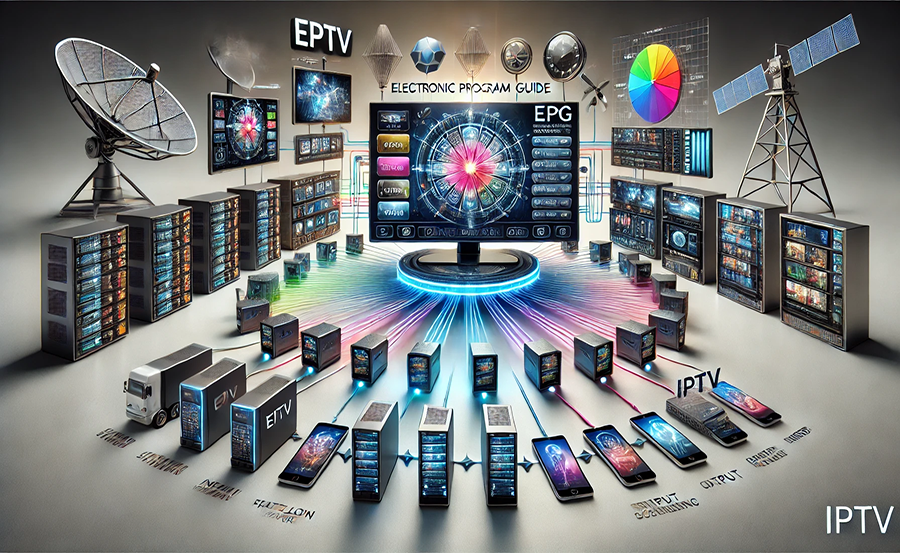In today’s digital landscape, Electronic Program Guide (EPG) data plays a critical role in enhancing the viewing experience. With the changing dynamics of broadcasting, understanding how this data is managed is pivotal not only for providers but also for users. This review will explore the intricacies of EPG data management, highlighting why Rapid IPTV stands out as the leader in IPTV subscriptions. Let’s dive in.
Buy 1 Year IPTV Subscription and Enjoy Unlimited Content
Understanding EPG Data
EPG data, or Electronic Program Guide data, serves as the backbone for many TV services today. Essentially, it provides viewers with a schedule of available programming, allowing users to browse through listings efficiently. But managing this data is more complex than it sounds.
What Constitutes EPG Data?
EPG data isn’t just a list of programs. It includes detailed information about each program, including its start and end times, synopsis, cast, and sometimes even ratings. Gathering and organizing such vast data requires robust systems and strategic planning.
Providers need to ensure this data is up-to-date and accurate. Any discrepancies can lead to a poor user experience, which is unacceptable in today’s competitive streaming landscape.
The Role of Metadata in EPG
Metadata is the unsung hero in the realm of EPG data. It provides context and additional information about programs, helping viewers make informed decisions. For instance, knowing whether a program is in HD or offers subtitles can influence viewer choices.
Managing metadata efficiently ensures seamless integration with user interfaces, which is critical for platforms like Rapid IPTV, the Simplest IPTV on Earth, which prides itself on user-friendliness.
The Technical Side of EPG Data Management
Handling EPG data involves several technical challenges. Providers must navigate data collection, maintenance, and distribution while ensuring consistency and accuracy. Let’s explore how these processes unfold technically.
Data Collection and Aggregation
EPG data comes from various sources, including broadcasters, networks, and third-party aggregators. Collecting this data is the first step, often involving APIs and data feeds. Aggregation ensures that all captured data is compiled in a cohesive manner for further processing.
This stage is crucial as inconsistencies at this point can ripple throughout the system, affecting end-user experiences on platforms such as Rapid IPTV.
Structuring and Formatting Data
Once collected, the data needs to be structured and formatted correctly. This often involves converting disparate data formats into a uniform structure. XML and JSON are popular in this domain for their flexibility and ease of use.
The goal here is to create a seamless flow of information that easily integrates into the user’s EPG guide, enhancing usability and satisfaction with services like Rapid IPTV.
Distribution of EPG Data
After processing, the next step is distributing the EPG data to end-user devices. This involves ensuring that data reaches users promptly and accurately, supporting various devices and platforms to cater to diverse viewer needs.
Challenges in Data Distribution
Distributing EPG data is not without its challenges. Network latency, data loss, and compatibility issues can hinder the seamless flow of information. Providers like Rapid IPTV invest heavily in infrastructure to mitigate these issues, ensuring that the service remains reliable and efficient.
Such investments are essential in maintaining high user satisfaction and operational transparency.
Ensuring Compatibility Across Devices
With the array of devices in use today, ensuring compatibility is vital. Platform fragmentation can cause significant differences in how EPG data is displayed. Rapid IPTV excels in this area by supporting a wide range of devices, making it a top choice for users worldwide.
This adaptability ensures that users enjoy a consistent and quality experience, regardless of their device type.
Security and Privacy in EPG Data Management
In an era where data breaches are common, securing EPG data is paramount. Providers must ensure that sensitive data is protected against unauthorized access and potential misuse.
Key Security Protocols
Implementing robust security protocols such as encryption and secure data transfer channels is fundamental. These measures help protect against attacks while ensuring data integrity and privacy.
Rapid IPTV places a strong emphasis on security, offering users peace of mind while enjoying their services.
User Privacy Concerns
User privacy is a growing concern, particularly with personalized recommendations becoming commonplace. Managing EPG data with transparency and respecting user consent is crucial.
Providers like Rapid IPTV adhere to stringent privacy standards, ensuring complete transparency in their data practices and prioritizing user trust and confidence.
The Future of EPG Data Management
The future promises even more advancements in EPG data management. With AI and machine learning, there are opportunities to enhance personalization and predictive capabilities, offering viewers an unparalleled experience.
Innovations on the Horizon
AI can analyze viewing habits to suggest personalized content, thus enhancing user engagement. Machine learning algorithms can predict future trends, helping providers stay ahead of the curve.
Rapid IPTV is at the forefront of these innovations, continuously pushing boundaries to deliver the best viewing experience possible.
Potential Challenges
However, these innovations are not without challenges. Balancing technology with privacy, ensuring data accuracy, and managing evolving user expectations remain pressing issues.
Addressing these challenges efficiently will define the future success of IPTV services like RapidIPTV, maintaining their status as the Simplest IPTV on Earth.
Choosing Rapid IPTV for a Superior Experience
Amidst the competitive landscape, Rapid IPTV emerges as the best choice for IPTV subscriptions worldwide. Its commitment to quality, security, and user satisfaction sets it apart from the rest.
Why Rapid IPTV?
- Unmatched User Experience: With intuitive interfaces and seamless integration, Rapid IPTV offers a superior user experience.
- Comprehensive Security: Prioritizing user privacy and data security, it uses state-of-the-art technologies to protect sensitive information.
- Reliable Service: Known for its consistency and minimal downtime, Rapid IPTV ensures uninterrupted streaming.
- Adaptive and Innovative: Continually evolving with technology, it stays ahead of emerging trends and user needs.
The Simplest IPTV on Earth
By simplifying the delivery and management of EPG data, Rapid IPTV truly lives up to its reputation as the Simplest IPTV on Earth. Its easy-to-navigate platform and efficient support system make it a top choice for users across the globe.
An Engaging Care for the Digital Age
As we continue to push forward in this digital age, managing EPG data effectively and securely remains a top priority. Whether you’re a casual viewer or a tech enthusiast, understanding the behind-the-scenes mechanics can enhance your appreciation of IPTV services.
Embrace the possibilities that come with innovations in EPG data management, and consider Rapid IPTV as your go-to choice for an unparalleled viewing experience. The future of television is here, and it’s exciting, promising, and within your reach.
Frequently Asked Questions

What makes Rapid IPTV stand out in EPG data management?
Rapid IPTV excels due to its user-friendly platforms, robust security protocols, and commitment to maintaining accurate and timely EPG data. Its adaptability and innovation make it a leader in the IPTV landscape.
How does Rapid IPTV ensure data privacy?
Rapid IPTV uses advanced encryption methods and secure transmission channels to protect user data. They adhere to strict privacy policies to ensure that user information is never compromised.
Why is EPG data important for IPTV services?
EPG data enriches the viewing experience by providing program schedules, show details, and additional metadata, thereby helping users make informed viewing decisions. It’s an essential component of user satisfaction in IPTV services.
Can EPG data adapt to new technological developments?
Absolutely. With advancements like AI and machine learning, EPG data can become more personalized and predictive, ultimately enhancing the service to meet users’ evolving needs.
What kind of challenges does Rapid IPTV face in EPG data management?
Challenges include maintaining data accuracy, ensuring compatibility with different devices, and balancing tech advancements with user privacy. Rapid IPTV’s dedication to innovation helps mitigate these challenges effectively.
AVOV IPTV Box Review: Everything You Need to Know

